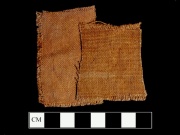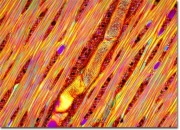Difference between revisions of "Sassafras"
Jump to navigation
Jump to search
m (Text replace - "== Authority ==" to "== Sources Checked for Data in Record ==") |
(→Risks) |
||
| (3 intermediate revisions by the same user not shown) | |||
| Line 4: | Line 4: | ||
Any of several shrubs or small laurel trees from the ''Sassafras'' genus (''S. variifolium'', ''S. albidum'', ''S. lauraceae'') that are native to the northern temperate region. Sassafras shrubs are commercially known for their fragrant oil that is used in perfumes, root beer, and tea. The soft, lightweight wood has a moderately coarse, but straight grain with an uneven texture. The lumber has been used for fence posts, cabinetry and furniture but it cracks and splits easily. The wood is often chipped then extracted with water to produce a rose-brown to gray color textile dye with good color fastness. | Any of several shrubs or small laurel trees from the ''Sassafras'' genus (''S. variifolium'', ''S. albidum'', ''S. lauraceae'') that are native to the northern temperate region. Sassafras shrubs are commercially known for their fragrant oil that is used in perfumes, root beer, and tea. The soft, lightweight wood has a moderately coarse, but straight grain with an uneven texture. The lumber has been used for fence posts, cabinetry and furniture but it cracks and splits easily. The wood is often chipped then extracted with water to produce a rose-brown to gray color textile dye with good color fastness. | ||
| − | [[File:salbidumbark.jpg|thumb|Sassafras | + | [[File:salbidumbark.jpg|thumb|Sassafras''Sassafras albidum'']] |
| − | |||
| − | ''Sassafras albidum'']] | ||
== Synonyms and Related Terms == | == Synonyms and Related Terms == | ||
| − | + | [[File:sassafrasalbidumlarge.jpg|thumb|Sassafras]] | |
saxifrax; ague tree (''Sassafras albidum''); cinnamon wood; saloop; golden deal (yellow sassafras); Sassafrasbaum (Deut.); sassafra (Fr.) | saxifrax; ague tree (''Sassafras albidum''); cinnamon wood; saloop; golden deal (yellow sassafras); Sassafrasbaum (Deut.); sassafra (Fr.) | ||
| + | == Risks == | ||
| − | + | * Wood is subject to insect and fungal attack. | |
| − | + | * One component of the oil (safrole) is toxic and considered a carcinogen. | |
| − | |||
| − | + | == Physical and Chemical Properties == | |
| − | |||
| − | |||
| − | |||
| − | |||
| − | |||
| − | |||
| − | |||
| − | + | * Medium tree growing to 30m with straight trunk. | |
| + | * Bark = Deeply furrowed brown color; when cut shows cinnamon color interior with strong spicy smell. | ||
| + | * Leaves = tri-lobal (25-30cm) . | ||
| + | * Other characteristics = yellow flowers in spring followed by blue berries. | ||
| + | * Wood density = 25-35 ppcf. | ||
| − | == | + | == Resources and Citations == |
* Rosalie Rosso King, ''Textile Identification, Conservation, and Preservation'', Noyes Publications, Park Ridge, NJ, 1985 | * Rosalie Rosso King, ''Textile Identification, Conservation, and Preservation'', Noyes Publications, Park Ridge, NJ, 1985 | ||
| Line 34: | Line 29: | ||
* ''The Merck Index'', Martha Windholz (ed.), Merck Research Labs, Rahway NJ, 10th edition, 1983 Comment: entry 6941 | * ''The Merck Index'', Martha Windholz (ed.), Merck Research Labs, Rahway NJ, 10th edition, 1983 Comment: entry 6941 | ||
| − | * | + | * Virginia Tech Dendrology website at www.fw.vt.edu/dendro/dendrology/main.htm (accessed Oct. 8, 2005) |
| − | * Wikipedia, | + | * Wikipedia,: http://en.wikipedia.org/wiki/Sassafras (Accessed Oct. 8, 2005) |
* G.S.Brady, ''Materials Handbook'', McGraw-Hill Book Co., New York, 1971 Comment: p. 751 | * G.S.Brady, ''Materials Handbook'', McGraw-Hill Book Co., New York, 1971 Comment: p. 751 | ||
Latest revision as of 10:42, 28 October 2020
Description
Any of several shrubs or small laurel trees from the Sassafras genus (S. variifolium, S. albidum, S. lauraceae) that are native to the northern temperate region. Sassafras shrubs are commercially known for their fragrant oil that is used in perfumes, root beer, and tea. The soft, lightweight wood has a moderately coarse, but straight grain with an uneven texture. The lumber has been used for fence posts, cabinetry and furniture but it cracks and splits easily. The wood is often chipped then extracted with water to produce a rose-brown to gray color textile dye with good color fastness.
Synonyms and Related Terms
saxifrax; ague tree (Sassafras albidum); cinnamon wood; saloop; golden deal (yellow sassafras); Sassafrasbaum (Deut.); sassafra (Fr.)
Risks
- Wood is subject to insect and fungal attack.
- One component of the oil (safrole) is toxic and considered a carcinogen.
Physical and Chemical Properties
- Medium tree growing to 30m with straight trunk.
- Bark = Deeply furrowed brown color; when cut shows cinnamon color interior with strong spicy smell.
- Leaves = tri-lobal (25-30cm) .
- Other characteristics = yellow flowers in spring followed by blue berries.
- Wood density = 25-35 ppcf.
Resources and Citations
- Rosalie Rosso King, Textile Identification, Conservation, and Preservation, Noyes Publications, Park Ridge, NJ, 1985
- F. H. Titmuss, Commercial Timbers of the World, The Technical Press Ltd., London, 1965
- The Merck Index, Martha Windholz (ed.), Merck Research Labs, Rahway NJ, 10th edition, 1983 Comment: entry 6941
- Virginia Tech Dendrology website at www.fw.vt.edu/dendro/dendrology/main.htm (accessed Oct. 8, 2005)
- Wikipedia,: http://en.wikipedia.org/wiki/Sassafras (Accessed Oct. 8, 2005)
- G.S.Brady, Materials Handbook, McGraw-Hill Book Co., New York, 1971 Comment: p. 751


